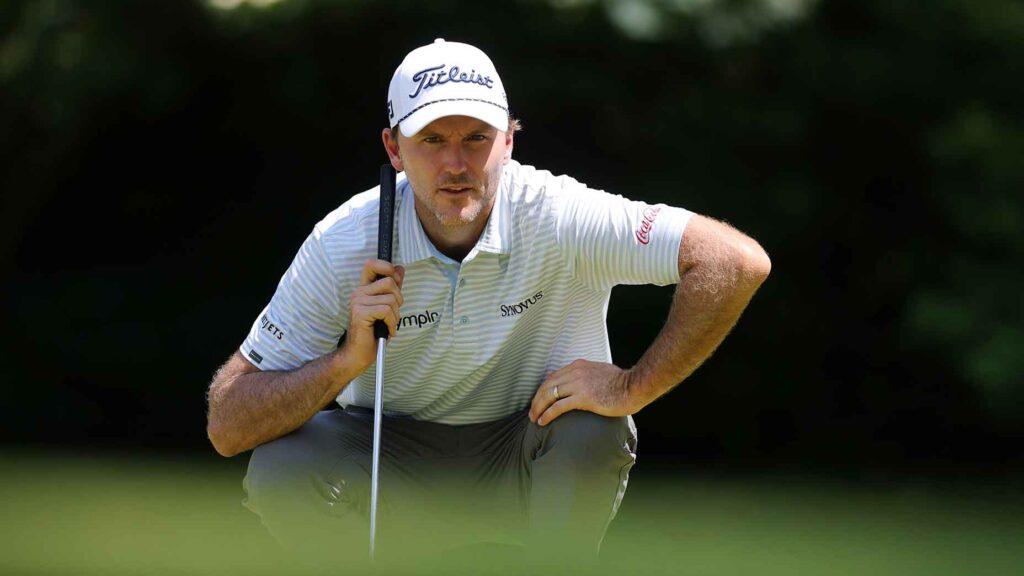The Fine Line in Pro Golf: What We Can Learn from the Travelers Championship
Professional golf is played on sprawling greens, but its outcomes often hinge on the smallest details. The recent Travelers Championship showcased this dichotomy perfectly, exemplified by the contrasting fates of Tommy Fleetwood and Keegan Bradley. Fleetwood’s unfortunate miss on a 6-foot, 8-inch putt stands out starkly against Bradley’s successful 5-foot, 8-inch birdie. This seemingly minor difference was pivotal in shaping the tournament’s narrative.
Equally compelling was Russell Henley’s self-imposed penalty during the competition, which occurred unnoticed by both cameras and fellow golfers. Henley became embroiled in controversy when his ball shifted imperceptibly—a fraction of an inch—as he prepared for his next shot. Feeling he had caused the movement, Henley decided to call in a rules official, emphasizing the integrity that defines professional play.
Henley’s compelling weekend culminated in a dramatic finish. Competing fiercely on the leaderboard, he holed out from the greenside rough on the 72nd hole, securing a birdie that guaranteed him a share of second place and a hefty prize of $1.76 million. However, this wasn’t enough for him to join Bradley in a playoff, a poignant reminder of the razor-thin margins that characterize professional golf.
The incident raises questions about the psychological burdens faced by golfers who honor the spirit of the game. Henley, reflecting on his actions, stated, “I knew something just happened there.” His adherence to the rules illustrates a deep-rooted belief in sportsmanship. Yet, his decision has stirred discussions among golf enthusiasts and professionals about how much weight to place on such self-regulations.
Henley’s integrity came to light when he invoked Rule 9.2a—clarifying that a player must be "virtually certain" they are the reason a ball has moved. In Henley’s case, this certainty was a burden he chose to shoulder, despite an official suggesting he could have continued without penalty. The nuance of the rule adds layers to the already complex psychology of competitive golf, where one mistake can alter the entire trajectory of a player’s reputation and success.
His decision to impose a one-shot penalty on himself is emblematic of the underlying principles that govern golf: honesty, respect, and accountability. Golfers often wrestle with the decision to call themselves out on infractions—a dilemma Henley has faced before, adding texture to his character as a player. The pressure to perform can lead many to overlook such infractions, giving Henley’s decision an even greater significance.
For fans and aspiring golfers watching at home, it is difficult not to be drawn into Henley’s narrative. His struggle prompts reflections on their own experiences—moments when integrity was tested on the course. Henley’s actions resonate, suggesting that fate in golf often turns on the smallest of margins—from deciding whether to call a penalty on oneself to the lengths one will go to uphold the spirit of the game.
Compounding this narrative is Henley’s history. He’s known for calling penalties on himself, a trait that he embraces as part of being a professional golfer. Previous instances, like the eight-stroke penalty from using a different ball type in 2019, showcase his commitment to the rules. While frustrating in the heat of competition, he believes that such moments shape a player and their journey.
Ultimately, Henley’s experience taps into a crucial theme in competitive sports: the importance of playing with integrity. He articulates this well, stating, “I just felt like it was the right thing to do.” Such sentiments not only define Henley as a player but serve as lessons for those navigating their own golfing journeys—reminding all that upholding the rules can sometimes carry a weighty burden.
In a world where cheaters often prevail, Henley’s commitment to fairness is refreshing, suggesting that honor in golf transcends victories and statistics. It’s a reminder of the integrity that has long been the foundation of the sport. As fans and players alike continue to discuss this incident, the deeper lesson remains clear: it is the small choices that define the greater narratives in the world of golf.
In conclusion, the Travelers Championship was more than just a tournament; it was a microcosm of the fundamental values of the sport. Through Henley’s choices and the contrasting fates of Fleetwood and Bradley, we are reminded that every putt, every stroke, and every split-second decision encapsulates the essence of professional golf. The game may be played on vast courses, but it is ultimately the minuscule actions that resonate the loudest.


